#Frenchmen Street Productions
Explore tagged Tumblr posts
Text








V-J/V-P Day
Following the atomic bombings of Hiroshima and Nagasaki, Emperor Hirohito announced Japan’s acceptance to the Potsdam Declaration and surrendered on 15th August 1945, effectively marking the end of World War II. However, the official surrender ceremony did not occur until over two weeks later, and thus President Truman marked 2nd September as the official V-J Day.
Learn about V-J Day
It is estimated that anywhere from 60 to 80 million people died during World War II, on all sides of the conflict. V-J Day should be seen as not only the celebration of the defeat of the tyrannical Japanese government of the time, but also the remembrance of those who lost their lives.
There are a number of different ways that people refer to V-J Day. This includes V-P Day, Victory in the Pacific Day, and Victory over Japan Day. No matter how people refer to this day, what matters is that it is the day on which Imperial Japan surrendered in the Second World War, marking the end of the war.
Interestingly, there are really three different dates that can be considered the date of surrender. The first is the 15th of August in 1945, which is when the announcement of Japan’s surrender was made. However, in some parts of the world, including the United States, this was actually the 14th of August in 1945 because of the time differences.
As mentioned, there is also the date that the official document of surrender was signed, which was the 2nd of September in 1945. This is when the Second World War was officially ended.
Because of this, V-J Day is celebrated on different dates throughout the world. While the official US commemoration occurs on the 2nd of September. In the United Kingdom, for example, they actually celebrate V-J Day on the 15th of August.
History of V-J Day
In order to understand the history of V-J Day, we need to delve deeper into the history of the war and the events that happened in the build-up to this date. On both the 6th and the 9th of August, in 1945, the United States dropped atomic bombs on both Nagasaki and Hiroshima. The Soviet Union also declared war on Japan on the 9th of August as well. A day later, on the 10th of August, the government in Japan communicated that it intended to surrender under the Potsdam Declaration terms.
Celebrations around the world started early when they heard that Japan intended to surrender. In Paris, Frenchmen and Americans paraded and sang “Don’t Fence Me In” on Champs-Élysées. On the streets of London, on Regent Street, allied soldiers danced in a conga line.
It was six days later, on the 15th of August, a little bit after noon Japan Standard Time, that it was announced that Japan had accepted the Potsdam Declaration. Emperor Hirohito made the announcement over the radio to the people of Japan. Once the declaration had been signed, the celebrations across the world really ramped up.
In fact, in Life Magazine, they reported the following about Americans celebrating:
It was “as if joy had been rationed and saved up for the three years, eight months and seven days since Sunday, Dec. 7, 1941”
There were a number of different terms that were included within the declaration. This included the following:
“We do not intend that the Japanese shall be enslaved as a race or destroyed as a nation, but stern justice shall be meted out to all war criminals, including those who have visited cruelties upon our prisoners.”
“The Japanese military forces, after being completely disarmed, shall be permitted to return to their homes with the opportunity to lead peaceful and productive lives.”
“Japanese sovereignty shall be limited to the islands of Honshu, Hokkaido, Kyushu, Shikoku, and such minor islands as we determine.”
Why not take a look at the Potsdam Declaration in full to learn more about V-J Day?
How to celebrate V-J Day
There are a lot of different ways that you can celebrate V-J Day. A lot of people have street parties and celebrate with their neighbors and their friends and families. This is something that people enjoy all over the world. It is an opportunity to be patriotic and show your love for the country you were born in. People like to hang up posters and bunting with their national flags, as well as enjoying traditional food and alcohol. What better excuse to have a party?
Of course, we cannot mention V-J Day without paying tribute to all of the men and women who lost their lives during World War Two. There are many different memorials and marks of honor that go on around the world on this day. As individuals, it is important that we all take a moment to reflect on those brave people who went to war for their country, with some never returning. Every year, it helps to learn more about the war and about the people who lost their lives. Pay honor to them and their families by researching these people as individuals and sparing some time to think about them.
You can also spend V-J Day learning more about the war. After all, there were many battles that were fought, and there are many documents, textbooks, and research papers on the war and the build-up of it. After all, years and years were spent in battle, and so there is a lot to read about. Enrich your knowledge so that you can have a better understanding of what the men and the women of your country went through during this period.
You can also learn more about the Japanese surrender. The start of the surrender can probably be dated back to the Battle of Okinawa, which started on the 1st of April and ended on the 21st of June in 1945. During this battle, there were more than 117,000 Japanese casualties, and over 82,000 U.S. casualties. It is also estimated that approximately one-fourth of the civilian population of Okinawan died, with a lot of people dying in mass suicides that the Imperial Japanese Army had organized. A month later, on the 26th of July, the Potsdam Declaration was issued. Truman stated the following to Japan:
“Surrender or suffer prompt and utter destruction.”
At the time, the declaration was rejected, but as we all know today, it then came to be accepted a month later.
It is important to remember that V-J Day is about more than just victory, though. We should think about all of the men and women, on both sides of the battle, who lost their lives, as well as the innocent civilians who were caught up in the middle of a horrific war. On V-J Day, we salute you.
Source
#Pacific Monument by Omri Amrany#Unconditional Surrender by Seward Johnson#Eduardo Kobra’s V-J Day in Times Square by Alfred Eisenstaed Mural#V-J Day#V-P Day#Sarasota#New York City#Community Veterans Memorial#Munster#Indiana#USA#travel#original photography#vacation#tourist attraction#landmark#cityscape#World War II#World War Two#2 September 1945#military history#US history#WWII#public art
2 notes
·
View notes
Text
you have to think of the term "JEW" in the bible in the same way you think of the word "FRENCH" it means someone from france, or in the case of jew someone from judea, now french person used to have distinct racial meaning right? a french guy was white maybe with a bit darker hair than a norseman nowadays due to demographic shift, if for instance someone stole your purse and you called hte cops and said "it was a frenchmen!" thats not as descriptive as it once was, it could be a dark haired whiteman holding a baguette but it just as easily could be an arab so its not a good physical descriptor.
the exact same thing happened with the term "jew" in biblical times, it just meant you were from judea, but had racial connotations as judeans tended to be "whiter than milk, with more rudiness of body than rubies and a polishing (eye color) of sapphire" but then after years in exile some of them came back with "visages blacker than a coal, they are unknown in the street as strangers, their skin has become withered it is like a stick" so the racial connotations of "jew" became muddled just like in france. jesus directly points out this DUAL parentage of jews in john 8
"but we have one father even god, we be not the product of fornication"
jesus the living god and ultimate authority on all things in perpetuity: nope you have two dads and one of them is the devil thats why you CANT understand me and act all messed up
0 notes
Text
Just discovered the whole illegal Christian production of Hamilton saga and my troll mind is going haywire. I’m so sorry in advance. Here are some total legit summaries of European musicals for you, American Christianity-style:
Christian Roméo et Juliette: The devil has come to Verona in the guise of a sensuous woman in black, reigniting an old feud between two prominent, god-fearing families. But lo, their insolent, disobedient children meet where they should not and fall into lust and sinfulness (“L’Amour Heureux”—“Will You Sleep With Me Someday?”). Party and pander to their lust is a Catholic Friar, a sinful nurse, and the Devil in Black who haunts them lewdly. The lovers’ sin is eventually discovered by their friends and family, who implore to them to come to Jesus (“On Dit Dans La Rue,” or “Come to Jesus!”). When the lovers meet their grisly end by making an erotically-charged deal with the devil, the Friar realizes the error in his doctrine and renounces the false doctrine of Catholicism for the true Protestant faith (“J’sais Plus”—“Jesus, Forgive Me”). The families are shocked by the discovery of their children’s depravity, and realize they’ve all been taken in by the devil. They, too, come to Jesus (“Coupables”— “Guilty / It’s Time For Us To Purge Our Sin”). For the finale, the ensemble sings “Aimer,” now “In Love (We Come To Jesus)” and “Les Rois du Monde,” now “King of the World (My Lord in Christ).” Gerard Presgurvic sues.
Christian Notre Dame de Paris: The purity and glory of Notre Dame de Paris Cathedral threatens to be tarnished by hordes of brown-skinned illegal aliens begging for government handouts (“Le Temps des Cathedrales,” lyrics unchanged). Three god-fearing men—the pious if tormented Frollo, his pitiful hunchback ward Quasimodo, and the handsome captain Phoebus who is about to marry a woman of good repute—struggle with carnal temptation in the form of street walker Esmeralda, who has her wanton eye on Phoebus (“Belle,” lyrics unchanged). When the noble Phoebus refuses her lustful advances at the last moment, (“Dechiré” or “Torn Apart / The Devil’s Tempting Me”) she tries to knife him. Frollo arrests her and overcomes his own temptation when the shameless harlot offers to sleep with him in exchange for her freedom. Esmeralda and her undocumented tribe are hanged and the three Frenchmen are reconciled to God again. Cocciante and Plamondon sue.
Christian Elisabeth: The glories of the 19th century Austrian empire are about to meet their end when pious Emperor Franz Joseph falls in love with and marries the atheist feminist heathen, Elisabeth. Elisabeth is proud, overeducated, and refuses to submit to male authority, (“Ich gehör nur mir”—“The Devil Is My Lord”) even when a pious and very macho angel of the Lord, Gabriel, saves her from death as a child. Gabriel tries to persuade the shrew to come to Jesus, but Elisabeth insists on her independence (“Wenn ich tanzen will,”—“I Am Lilith’s Heir”). But when Elisabeth is raped and killed by an evil Italian, Luigi Lucheni, Gabriel comes to redeem her and she realizes the error of her ways (“Ich gehör nur mir Reprise” or “Now Jesus Is My Lord”). She ascends to heaven in Gabriel’s manly Christian arms. Lévay and Kunze sue, but are relieved: They’ve been done worse by the Americans before.
#romeo et juliette#retj#elisabeth das musical#notre dame de paris musical#cristina is silly#i’m crying#american christianity in so many ways is beyond parody#european musicals
5 notes
·
View notes
Photo




Book Recs: Supernatural Thrillers
The Bright Lands by John Fram
The town of Bentley holds two things dear: its football, and its secrets. But when star quarterback Dylan Whitley goes missing, an unremitting fear grips this remote corner of Texas. Joel Whitley was shamed out of conservative Bentley ten years ago, and while he’s finally made a life for himself as a gay man in New York, his younger brother’s disappearance soon brings him back to a place he thought he’d escaped for good. Meanwhile, Sheriff’s Deputy Starsha Clark stayed in Bentley; Joel’s return brings back painful memories - not to mention questions - about her own missing brother. And in the high school hallways, Dylan’s friends begin to suspect that their classmates know far more than they’re telling the police. Together, these unlikely allies will stir up secrets their town has long tried to ignore, drawing the attention of dangerous men who will stop at nothing to see that their crimes stay buried. But no one is quite prepared to face the darkness that’s begun to haunt their nightmares, whispering about a place long thought to be nothing but an urban legend: an empty night, a flicker of light on the horizon - The Bright Lands.
Reviver by Seth Patrick
Revivers. Able to wake the recently dead, and let them bear witness to their own demise. Twelve years after the first reviver came to light, they have become accepted by an uneasy public. The testimony of the dead is permitted in courtrooms across the world. Forensic revival is a routine part of police investigation. In the United States, that responsibility falls to the Forensic Revival Service. Despite his troubled past, Jonah Miller is one of their best. But while reviving the victim of a brutal murder, he encounters a terrifying presence. Something is watching. Waiting. His superiors tell him it was only in his mind, a product of stress. Jonah is not so certain.
Then Daniel Harker, the first journalist to bring revival to public attention, is murdered, and Jonah finds himself getting dragged into the hunt for answers. Working with Harker's daughter Annabel, he becomes determined to find those responsible and bring them to justice. Soon they uncover long-hidden truths that call into doubt everything Jonah stands for, and reveal a threat that if not stopped in time, will put all of humanity in danger.
Build Your House Around My Body by Violet Kupersmith
1986: The teenage daughter of a wealthy Vietnamese family loses her way in an abandoned rubber plantation while fleeing her angry father and is forever changed. 2011: A young, unhappy Vietnamese American woman disappears from her new home in Saigon without a trace. The fates of these two women are inescapably linked, bound together by past generations, by ghosts and ancestors, by the history of possessed bodies and possessed lands. Alongside them, we meet a young boy who is sent to a boarding school for the Métis children of French expatriates, just before Vietnam declares its independence from colonial rule; two Frenchmen who are trying to start a business with the Vietnam War on the horizon; and the employees of the Saigon Spirit Eradication Co., who find themselves investigating strange occurrences in a farmhouse on the edge of a forest. Each new character and timeline brings us one step closer to understanding what binds them all. Part puzzle, part revenge tale, part ghost story, this book takes us from colonial mansions to ramshackle zoos, from sweaty nightclubs to the jostling seats of motorbikes, from ex-pat flats to sizzling back-alley street carts. Spanning more than fifty years of Vietnamese history and barreling toward an unforgettable conclusion, this is a time-traveling, heart-pounding, border-crossing fever dream of a novel that will haunt you long after the last page.
Book of Night by Holly Black
In Charlie Hall’s world, shadows can be altered, for entertainment and cosmetic preferences - but also to increase power and influence. You can alter someone’s feelings - and memories - but manipulating shadows has a cost, with the potential to take hours or days from your life. Your shadow holds all the parts of you that you want to keep hidden - a second self, standing just to your left, walking behind you into lit rooms. And sometimes, it has a life of its own. Charlie is a low-level con artist, working as a bartender while trying to distance herself from the powerful and dangerous underground world of shadow trading. She gets by doing odd jobs for her patrons and the naïve new money in her town at the edge of the Berkshires. But when a terrible figure from her past returns, Charlie’s present life is thrown into chaos, and her future seems at best, unclear - and at worst, non-existent. Determined to survive, Charlie throws herself into a maelstrom of secrets and murder, setting her against a cast of doppelgängers, mercurial billionaires, shadow thieves, and her own sister - all desperate to control the magic of the shadows.
#thrillers#supernatural#fantasy#fiction#TBR pile#tbr#to read#book recs#book recommendations#reading recommendations#booklr#library books
5 notes
·
View notes
Text
Emily in Paris or why I stopped caring for the main character and started rooting for the French. Episode 2.
I must confess one thing. I have a sort of admiration for people who have the habit and the will of go running before work, because I don’t do these things, and people who can do it while wearing what seems like a lace top (?) maybe more adequate for other things, but who am I to judge if Emily looks perfectly fine when running while I look like a bag with sport wear. So congratulations Miss Cooper you are doing well in this aspect. Also shows that Emily is adapting her schedules and her habits to her new life. Example: she’s not going to arrive early to work this time. Lesson learnt, so good for her!

Unfortunately there are still things she must get right. Example given, knowing exactly where her apartment is. She again tries to invade her cute neighbour’s home, which causes him to ask if she wants to live in his apartment. At this stage, there are reasons to suspect indeed. But there’s no time enough for our two character to devour each other with their eyes, so, after a last invitation to bang anytime from our delicious neighbour Emily goes back home to get a shower and dress for work.

Her white boots, however, have an unfortunate encounter with a material of animal origin. She’s naturally disgusted and deals with it making another Instagram post. Discovering, by the way, that she’s gaining more and more followers for ther photos of fictional! Paris.
Sidenote: this scene can mean two things from yours truly’s point of view. Either Emily’s next days are going to be shitty or she’s going to be ultimately lucky. In France or Spain is very common to wish good luck with the word merde (or well, mierda in Spanish). In both cases it comes from the times people went to theatre or opera house in carriages drawn with horses. So a load of shit meant: you are in the greatest show in town. But probably is not that deep.
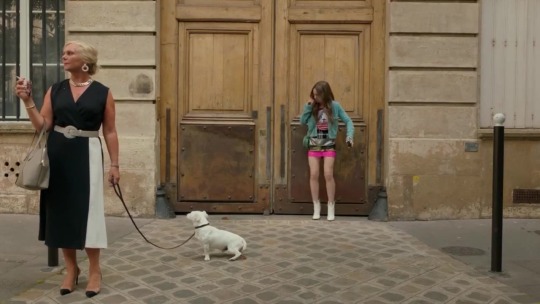
At Savoir, la Plouc is decaying as Emily’s sobriquet, and only Julien greets her with it. Besides, Emily has learn to strike back. Or rather is her smartphone the one she uses to retort Va te faire foutre! Which mean Fuck you but it’s not that imaginative. Why not mange tes morts, or some decent French swearing. Anyway well done, Emily, because this makes her earn Julien’s respect.

... But evidently not Sylvie’s. She is clearly contemplating the void and wondering if some kind of karmic justice has sent her this girl that can’t figure out why is la plouc instead of le plouc or won’t pronounce the name of the fragance De L’Heure from Lavaux. Sylvie doesn’t want to listen her ideas for promoting Lavaux’s last product. A little discussion insues between the two ladies. Must luxury remain an enclosed world? Should it be democratized in some way? Of course Emily thinks the point of view of an outsider could help, but, could you point at the outsider in this scene? Of course Emily is not French and still dealing with the continuous cultural clash. But she doesn’t seem an outsider by any means. And, ah. There’s a launch party for De L’Heure so she better hurry up and put some thing that doesn’t resemble whatever she’s wearing.

Was that fashion advice from Sylvie? Who knows. In any case, Emily looks quite pretty with her black dress. The handbag is funny but highly debatable. And she’s overjoyed and bubbly as she pursues trays full of delicious food. Which is a faux pas, from Sylvie’s point of view.

Enter Antoine Lambert from Maison Lavaux a.k.a. another Frenchman who is going to be attracted towards Emily’s many charms. Because that’s what Frenchmen do in this series. She fails to understand what a nose means in the world of fragances - it’s not that harsh to figure out, sometimes I wonder why they have written her like that; she’s suffering a severe case of cultural clash, but it doesn’t mean she’s stupid, argh -. Antoine is creeptractive. Especially in the next scene.
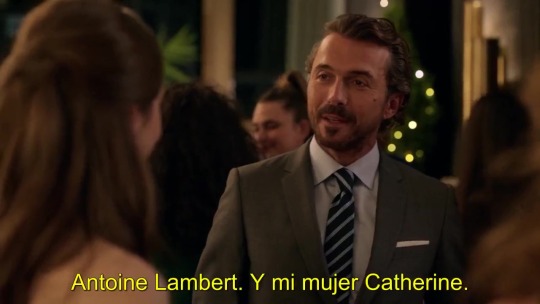
Which takes place in this terrace with the gorgeous view of a glittering Eiffel Tower. This makes Emily smile and would do everyone else who had the opportunity to assist. This makes up for Sylvie saying that she’s talking too much about bussiness during the party, which is something she should not do.

Monsieur le Creeptractive follows her and tests the fragance on her skin. A really weird dialogue about how she should have a French boyfriend because you learn French in bed... Yeah, sure. Emily profess her fidelity to her engaged to be engaged Doug back in Chicago. Something that he doesn’t deserve but more on that immediately after. He smells her in a way that would make many women shudder and run away and compliments (?) her on smelling like expensive sex. Yikes yikes yikes.
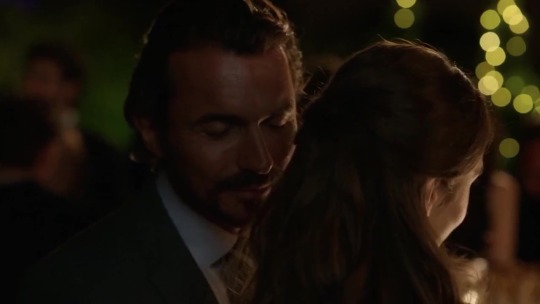
All in all, is a successful night for Emily, but as she discovers the next day, she’s supposed to work not in the promotion of De l’Heure, but in some product called Vaga-Jeune to help woment to combat vaginal dryness. Is that a mean move by Sylvie, or it’s only a logical thing for Emily to start there, given she has experience in pharmaceuticals? Discuss. She also tells our heroine not to be too flirty with Antoine, who is married to one of her very good friends. But immediately after Julien drops the bomb: Sylvie is actually Antoine’s mistress. Oops.

In order to deal with the amount of unwanted information, Emily texts to Mindy and they go for a dinner. Mindy gives her a few tips to survive in the complicate environment of a city where everyone is having affairs with everyone. As if in Paris - like everywhere else - didn’t exist people who doesn’t care about sex. In this universe, Emily still can’t wrap her head around the endemic lack of conyugal fidelity in this series.

We learn more about Mindy, who maybe would deserve more than being only Asian token character which is supportive of the main one just because. Indeed Mindy is for now my favourite character here, along with Sylvie. Mindy turns out to be in Paris because her millionaire zipper king father wanted her in the bussiness school, but, since living in Paris was one of her dreams, Mindy dropped it and became a nanny instead. Now she’s been cut off by dad, but she’s free and, besides, she finds funny to have grown up surrounded by nannies and now being one of them.

The temptation of MIndy taking over Emily in this series is too big when just in the next scene she thinks she can “educate the chef a little bit about customer service” without even tasting her steak, which she wants done more. Customer are not always right; some of them behave like annoying assholes. She swallows her words as Gabriel from downstairs emerges from the kitchen because of course he’s the chef. Somewhat that convinces her she should taste the steak before giving her opinion. It turns out the steak is wonderful, it was wonderful the whole time. Emily please. Try to behave.
(also Mindy wouldn’t mind to taste the chef instead of the steak, which is understandable)
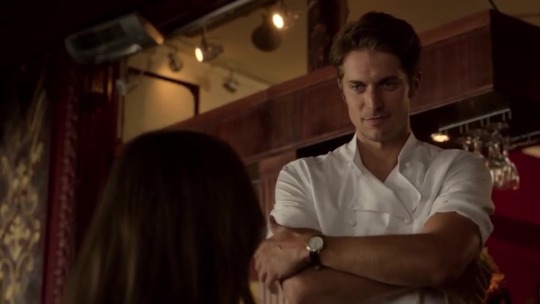
Next day Emily is happily roaming around the market with a little hat perched on her head and the mind full of Chicago Boyfriend Doug. The little hat is so stupid that it’s almost charming, like someone more fit for a musical than for real people walking on real streets. She seems to have befriended the woman from the boulangerie, too! However, the happiness is to be shortlived...

... Because Doug, as his first scene already indicated, is someone who can’t bother to take his ass into a plane and fly to Paris where there is nothing to do while expecting for his girlfriend to come back from job. This guy must have one, but he’s so lazy that one wonders if he inherited it. Notice that, unlike in Paris, there are cars in Chicago. Doug proceeds then to inelegantly dump his girlfriend by phone.
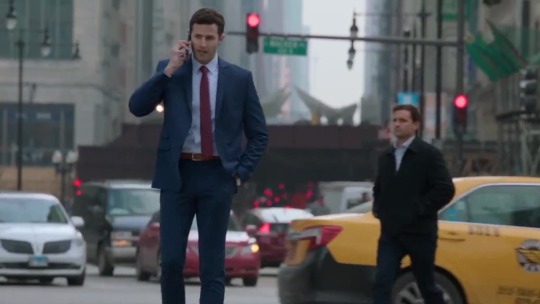
Very fitting to have Emily standing just next to the Panthéon when the call is over and their relationship as dead as the people inside.

Emily is logically sad after this and the weather seems to agree with her mood, probably she cried to her sleep, or at least she shed some tears. He doesn’t deserve it, honey.

Her mood doesn’t improve when, at the office, she discovers a new thing. Yes, you have grammatical gender in French, as well as in other European languages. She is puzzled because, starting her campaign for Vaga-Jeune, she discovers vagine is a masculine word in French. She doesn’t understand it, and, in typical Emily fashion, she decides the problem is with this language she knows virtually nothing about.

She also learns a very important word for her future life in Paris: grève, which means strike. And it’s not going only a vagina strike. But who knows, she lives in a parallel universe so maybe there are no strikes there (since there is no public transport and/or services on sight even if we know it exist somewhere). And of course, post something on her Instagram account about how vaginas are not masculine.

During her (daily, one guess) conversation with Mindy during the lunch break, Emily loses at last this overoptimistic side of her that makes the character annoying and vents a little about her general exasperation. She thinks she’ll never learn the language (but girl, you barely tried, don’t be so harsh with yourself), or be simply tolerated by her workmates, or even understand how the city was built. She’ll be all right, Mindy insists, not very impressed at her friend’s disperation.

Which follows is one of the most cringeworthy deus-ex-machina I have seen, and adequately being a deus-ex-machina it comes from l’Élysée. Wink wink, mythology aficionados.

By the way, it’s that the façade which gives to the main courtyard of the French presidential palace? Yes it is. Here I am wondering where this footage came from and when it was filmed because I am that way. Seems the flag is at half mast from that point of view so... this could help to know in which moment was filmed... But screw that, you aren’t here for my personal obsessions, so lets go right to the point.
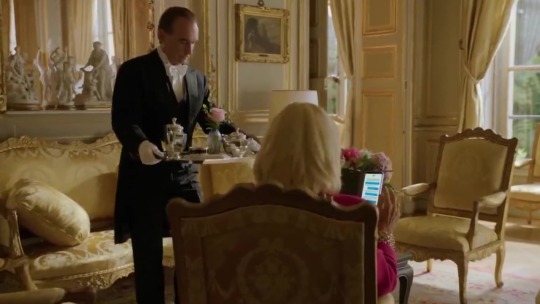
Somewhat Carla Bruni finds Emily’s post about vaginas utterly fascinating, to the extent that she has to share it with Brigitte Macron. And of course the current French First Lady (even if officially there is not such title in France) agrees and posts it in her Twitter account. We only see Fictional!Brigitte from her back. Real Brigitte doesn’t have accounts on social networks, by the way, which is understandable since after a while one gets tired of playing the game of guessing if the one who made the mysoginist and idiotic post is from the extreme right or the extreme left (it’s a difficult thing to tell apart, I assure you). Of course Emily’s post gets viral.

Brigitte Macron just retweeted you, bitch! is not bad as unexpected sentence on a screenplay in 2020, congratulations. Her partners at Savoir are overjoyed and suddenly Emily can share a table with them, yay! Though evolving from la plouc to our Vaga-Jeune is not really improving that much I guess? So that’s the end of the episode and Emily’s life seems not-so-that-depressing all of a sudden. So thank you Brigitte.

And that was Episode 2 of Emily in Paris. Our heroine was slightly less annoying than on first one, probably because the reality of being in a totally different country is starting to hit her and she’s had a few humblings by this moment. For the next one, we’ll know more about Monsieur le Creeptractive & the nonsense of fragance advertisements.
20 notes
·
View notes
Text
For @clarasimone @mormontlady @myloveiainglen et al. COULD HE BE ANY MORE DREAMY? 😱
(I highlighted the parts that stood out most to me)
—————————————-
IS HE THE REAL THING?
In and around the Prince Edward Theatre a sense of bristling urgency is evident. Out on Soho’s Old Compton Street men shin up ladders and position huge posters in glass frames on its walls; inside, stagehands stride briskly around, looking purposeful and barking staccato phrases.
All this bustle is in aid of ensuring a good send-off to one of the most anticipated West End musicals of recent years, Martin Guerre, the latest creation of the two Frenchmen, Alain Boublil and Claude-Michel Schönberg, whose Les Misérables and Miss Saigon are seemingly permanent fixtures on London’s theatre scene.
It’s a £3.5-million production a lot is riding on it. But you’d never know it from a visit to the dressing room of Iain Glen, the star of Martin Guerre. Upstairs, the atmosphere may be sticky, rushed and stressful; in here, it is cool and tranquil, and Glen is talking about the role in calm, soothing tones.
“If you fall on your face you fall on your face. It’s only theatre,” he says in his genteel Edinburgh accent. “I’m philosophical about it. Nothing comes of worrying if I’ll be good enough. You just have to be careless enough to think, well, I’ll just give it a go.” He smiles beatifically.
My first reaction is to phone the producer Cameron Mackintosh and ask if he knows of his star’s nonchalant attitude. (😂) My second is to wonder if Glen is in an advanced state of denial, or just failed to grasp the problem. The stakes are, in theatrical terms, sky-high; and as Arnaud a soldier who turns up in a 16th-century French village claiming to be Martin Guerre, one of its natives feared long dead in the wars Glen is pivotal to the show’s success.
Because Martin Guerre is a sung-through musical, with a mere smattering of spoken dialogue, Glen’s serene demeanour is even harder to comprehend: he is, after all, a man who has never sung on stage in his life. “I play guitar and piano but I’ve only ever sung to my Mum and Dad,” he says.
He’s been chosen for his acting, of course. Before Miss Saigon, remember, Jonathan Pryce was not exactly noted for his singing. “They’re story-tellers” says Glen of Boublil and Schönberg, “and I think they feel actors can tell stories more effectively than someone who has only trained as a singer.”
In nine years since leaving Rada, Glen, 33, has amassed a wide range of credits. But nothing prepared him for the rigours of starring in a musical.
Mackintosh cast him just before Christmas, then ordered him to do intensive voice work. Glen readily agreed. “I had no real confidence in my singing, and I’d have been too terrified to try and cruise through.” He has since attended three singing lessons a week, and is drinking four litres of bottled water a day to protect his vocal chords.
And now? “Singing is like running 100 metres,” he reports. “The more you do it, the easier it becomes. “ He also finds it induces exhilaration and has been surprised to find himself moved by the French duo’s songs. “We did a first run-through with a 40-piece orchestra at Sadler’s Wells, and I was overawed. Music I’d heard being plonked on a piano for the previous 10 weeks was suddenly being played by violins, clarinets and bassoons. I started to cry at one point in the middle of a song, it was so overpowering.”
He grew up in Edinburgh and attended Aberdeen University, where the drama society lured him. As a Scot with an Equity card, he found work came early after Rada, and soon did a couple of Screen 2 dramas for the BBC in Scotland.
After the film Mountains of the Moon, Glen’s blond, clean-cut, square-jawed looks attracted Hollywood producers. “I was offered a couple of films that went on to be quite big in America,” he says. “But they just didn’t excite. Since then, I’ve been happy not to be typecast.”
Stardom then has not been an issue until now. Glen and his wife, actress Susannah Harker, try to live a quiet life in a suburban London with their 13-month-old baby son, Finlay. “In this country, it’s possible to have a rich, varied career without being spread all over the tabloids,” he says. “A lot of the actors I admire most can quite happily go shopping and not be bothered.”
Glen is a pleasant man who seems to think it is within his power to keep stardom at arm’s length and his private life private. As I leave the cool quiet of his quarters and rejoin dozens of stagehands and technicians upstairs, hotly labouring to make Martin Guerre a hit, the thought occurs: he may be in for a shock on both counts.
– By David Gritten
34 notes
·
View notes
Text
11 U.S. Cities Perfect for a Weekend Getaway
The Way to spend time: Cover as much as you can of the 1,200-acre Balboa Park, spend a day on Coronado Island, and finish each night with a sunset at Sunset Cliffs. Eat your fill of California burritos in Nico's Mexican Food, and drink your plenty of beer from breweries including Ballast Point, Mike Hess, Stone Brewing, and AleSmith. Proceed south of the border, too, with Turista Libre, which takes travelers to hyper-local areas in Tijuana and Valle de Guadalupe.
Denver, Colorado
The Way to spend your time: After checking into the Art Hotel, spend a day at the seven-story Denver Art Museum with Monet's Le Bassin des Nympheas and Paul Klee's Palace Partially Destroyed, followed by a meal at Avelina. On day two, take advantage of this recently revived Winter Park Express Ski Train, which goes from downtown Denver to Front Range's Winter Park Resort in two hours. Come warmer weather, head 16 kilometers west of downtown Denver to the almost 900-acre Red Rocks Park, that has miles of hiking trails, sandstone cliffs, and also a geologically shaped amphitheater that's hosted everyone from The Beatles to Stevie Nicks.
New Orleans, Louisiana
The Way to spend your time: Eat Shaya and Brennan's, each of which left our best restaurants in the entire word list, along with the latter of which has been firmly entrenched in the French Quarter as 1942. Crush a bag of beignets at Morning Call, which has considerably shorter lines compared to Cafe Du Monde--and pristine City Park views. When the sun sets, go beyond Bourbon Street, also do not miss music-driven evenings on Frenchmen Street, which has the Big Easy's most celebrated jazz.
Philadelphia, Pennsylvania
How to spend your time day in Fishtown, namely to wait in line for Pizzeria Beddia and crawl out of microbrewery into a microbrewery. A day of walking: Wander along North 3rd Street (duck into Art in the Age of Mechanical Reproduction) and East Passyunk (play a 60-minute' Escape the 80s' match ) before dinner in Michael Solomonov's Dizengoff or Zahav, where you'll dip into some of the best hummus in the nation. Finish at Hop Sing Laundromat, a somewhat-hidden cocktail bar and a rite of passage.
Baltimore, Maryland
The Way to spend your time: Eat your Way out of a new restaurant to the next before (shh) everybody puts in on the key: think Argentinean empanadas at Bar Vasquez; seafood risotto in Cosima; tea-smoked duck breast in Gunther & Co., and barbecue-flavored ice cream out of meals hallway R. House. Stroll off the moments across the historic Inner Harbor, and hop in an hour-long tour, by boat, of what has been deemed among the most underrated cities in the U.S. Catch a show at the gorgeous, refurbished Hippodrome Theatre. Allot three hours to the Baltimore Museum of Art, and get lost in Lexington Market, that will be like the Pike Place Market of Baltimore--if Pike Place was open since 1782, that's.
Portland, Maine
The Way to invest your time: Take the ferry to Peaks Island. Eat your weight in lobster rolls at Portland Lobster Company, and make sure to also hit Central Provisions, The Honey Paw, and Eventide Oyster Co., the"oyster bar of your dreams." (More than a dozen local craft breweries including Allagash and Rising Tide supply the drink; if you're sick of beer, attempt Portland Hunt & Alpine Club.) Walk panoramic Fore Street. Hop on a bicycle for a 6.5-mile flat loop of Portland, which sits on a peninsula, or spend a day" hiking" 70 miles of the increased city through Portland Trails. Push into Portland Head Light, a still-operational light station that has occupied its place five kilometers south of town because of 1791.
Nashville, Tennessee
How to spend your time: Start the day with a cup of house-roasted coffee at Crema. Shop 12 South for a souvenir: a customized pair of jeans from Imogene + willie, maybe, or handcrafted objects from White's Mercantile, a modern twist in an old-time general store curated by Hank Williams's granddaughter Holly. Eat sexy chicken from Hattie B. Honkytonk on Second Avenue at Robert's Western World, or Remain in the Gulch for bluegrass at The Station Inn. Spend two hours in the Frist Museum for Visual Arts, which was Nashville's central post office.
Charleston, S.C.
How to spend your own time: Take a walking tour of 18th-century architecture, and pick your preferred Georgian mansion from Rainbow Row or The Battery. Read a book under the 1,000-year-old, 1,700-square-foot Angel Oak Tree, and nap on the beach of Sullivan's Island. Make a booking at Husk. Possessing a fried chicken sandwich (or 3 ) in Leon's Oyster Shop--it's been known to make even the most severe vegetarian drop off the wagon, and no doubt contributed to Charleston being voted the most magnificent little city in the U.S. To burn those calories, walk into the middle of the Ravenel Bridge (1.25 miles) for sunset over the Cooper River--or say, hey, I'm on vacation, and have a cocktail on the roof of this Dewberry instead. Once the evening has entirely fallen, head within the centuries-old Dock Street Theatre for local and Broadway touring productions.
Minneapolis, Minnesota
The Way to spend your own time: Create artsy Lyndale, one of Airbnb's hottest areas of 2017, your foundation. Pay homage to hometown hero Prince in Paisley Park Museum one afternoon, or browse where the musician himself often shopped for music at indie store Electric Fetus. Lake hop: Lake Harriet, Lake CalhounLake, and Lake of the Isles are connected. Beer from Surly Brewing Company, dessert from Milkjam Creamery, and James-Beard award-winning Minnesotan cuisine in The Bachelor Farmer. Spend a couple of hours at the Walker Art Center, one of the nation's most excellent contemporary art museums. The American Swedish Institute is much more fun than it seems; and the Jucy Lucy from Matt's Bar--a beef patty with a core of molten cheese--is much better than it looks, intentional misspellings apart from
Madison, Wisconsin
The Way to spend your time: Bike 12 miles around Lake Monona. Make such as a Badger and wander some of those 20-plus miles of paths at the UW Arboretum (or, in winter, ski, snowshoe, or increase them), until filling up on fried cheese curds and Ale Asylum in Dotty Dumpling's Dowry. Take a 40-minute road trip to visit the New Glarus Brewing Company, which only awakens in Wisconsin. Take a 50-minute street trip to the shore and Ice-Age rock formations of the Driftless region. Get your art fix at the Chazen Museum of Art and the stunning, glass-walled Madison Museum of Contemporary Art. Shop in the Saturday morning farmers' market on Capitol Square, reportedly the largest producer-only farmers' market in the nation. Eat dinner at Estrellón, and spare room for the Basque cake.
Louisville, Kentucky
How to spend time a sexy brown in The Brown Hotel. Walk the Old Louisville neighborhood, which allegedly has the most extensive collection of Victorian homes in the country. Pay tribute to The Louisville Lip in the Muhammad Ali Center. Take a trip to Maker's Mark and dip your bottle of Kentucky bourbon. Pop from the Speed Art Museum, fresh off a $50 million renovation and expansion. Do not miss a performance from the LGBT theater troupe Pandora Productions.
1 note
·
View note
Text
Law School Loves Wed at NOPSI Hotel New Orleans
The NOPSI Hotel New Orleans is one of the hottest new venues! We loved filming Zoe and Hayter’s dreamy wedding reception in this hotel’s beautiful exposed brick ballroom. The color palette for this wedding was stunning with rich pinks and reds, accented with gold geometric pieces. These two lovebirds also said their wedding vows in another new venue, the Four Winds.
Coordination and Design // Z Event Company
Prep and Reception // NOPSI Hotel New Orleans
Ceremony // Four Winds
Cinematography // Bride Film
Photography // Dark Roux
Reception Band // Phunky Monkeys
Florals and Decor // Kim Starr Wise
Lighting and Decor // Firefly Ambiance
Makeup // Flawless Bride
Hair // H2O Salon
Ice Bar // Ice Dragon
Reception Entertainment // Frenchmen St. Productions
Cake // Bittersweet Confections
Transportation // Limo Livery
Sushi // Kazu Sushi
Event Rentals // True Value
Andy Do
Photobooth // Boogie Booth
Monica Kelly
Rentals // Event Rental (Element)
Custom Name Sign // NameGLO
Linens // Mosaic Linens
Lighting and Sound // SeeHear Productions
Ceremony Music // Harry Hardin
#Z-Events#NOPSI Hotel New Orleans#Dark Roux#The Phunkey Monkeys#Kim Starr Wise#Firefly Ambiance#Flawless Bride and Beauty#H2O Salon#Bittersweet Confections#Limo Livery#Frenchmen Street Productions#Boogie Booth#Element#See Hear Productions#Harry Hardin#Mosaic Linens#Bride Film weddings
0 notes
Text
Prints & products available featuring this LIVE artwork! Created live during a brass band set on Frenchmen Street New Orleans.
#neworleansart#paintersofinstagram#abstractartwork#jazz#brassband#neworleansbrass#liveart#liveartistforhire#livemusic#painting
1 note
·
View note
Text


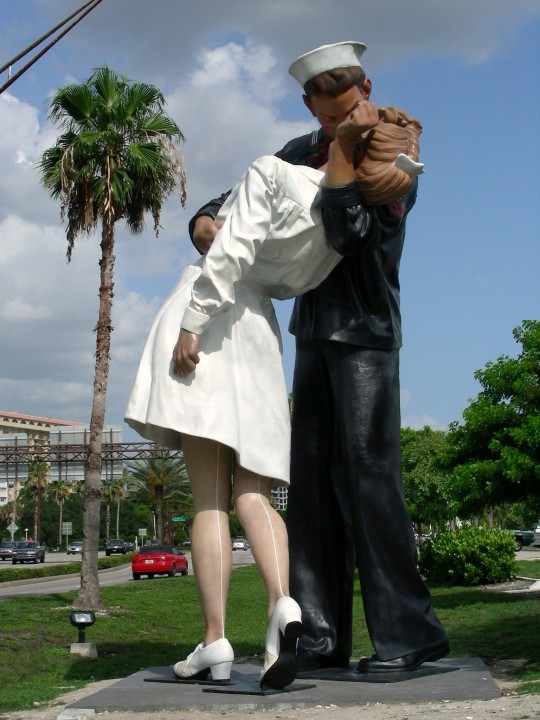




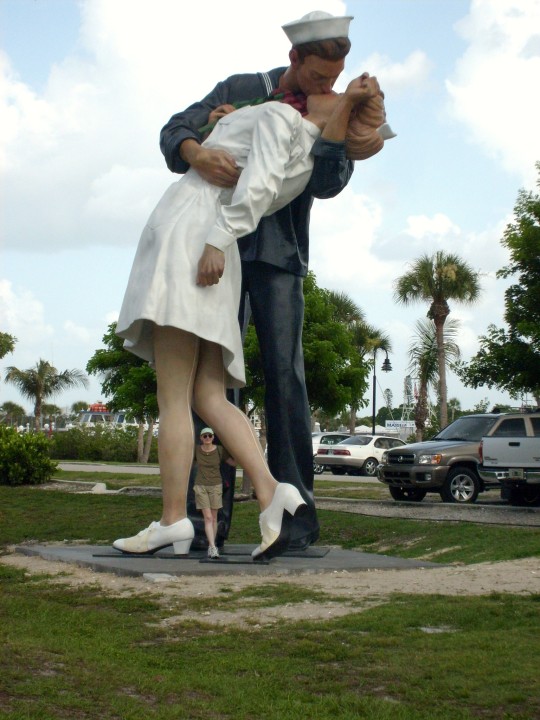
V-J/V-P Day
Following the atomic bombings of Hiroshima and Nagasaki, Emperor Hirohito announced Japan’s acceptance to the Potsdam Declaration and surrendered on 15th August 1945, effectively marking the end of World War II. However, the official surrender ceremony did not occur until over two weeks later, and thus President Truman marked 2nd September as the official V-J Day.
Learn about V-J Day
It is estimated that anywhere from 60 to 80 million people died during World War II, on all sides of the conflict. V-J Day should be seen as not only the celebration of the defeat of the tyrannical Japanese government of the time, but also the remembrance of those who lost their lives.
There are a number of different ways that people refer to V-J Day. This includes V-P Day, Victory in the Pacific Day, and Victory over Japan Day. No matter how people refer to this day, what matters is that it is the day on which Imperial Japan surrendered in the Second World War, marking the end of the war.
Interestingly, there are really three different dates that can be considered the date of surrender. The first is the 15th of August in 1945, which is when the announcement of Japan’s surrender was made. However, in some parts of the world, including the United States, this was actually the 14th of August in 1945 because of the time differences.
As mentioned, there is also the date that the official document of surrender was signed, which was the 2nd of September in 1945. This is when the Second World War was officially ended.
Because of this, V-J Day is celebrated on different dates throughout the world. While the official US commemoration occurs on the 2nd of September. In the United Kingdom, for example, they actually celebrate V-J Day on the 15th of August.
History of V-J Day
In order to understand the history of V-J Day, we need to delve deeper into the history of the war and the events that happened in the build-up to this date. On both the 6th and the 9th of August, in 1945, the United States dropped atomic bombs on both Nagasaki and Hiroshima. The Soviet Union also declared war on Japan on the 9th of August as well. A day later, on the 10th of August, the government in Japan communicated that it intended to surrender under the Potsdam Declaration terms.
Celebrations around the world started early when they heard that Japan intended to surrender. In Paris, Frenchmen and Americans paraded and sang “Don’t Fence Me In” on Champs-Élysées. On the streets of London, on Regent Street, allied soldiers danced in a conga line.
It was six days later, on the 15th of August, a little bit after noon Japan Standard Time, that it was announced that Japan had accepted the Potsdam Declaration. Emperor Hirohito made the announcement over the radio to the people of Japan. Once the declaration had been signed, the celebrations across the world really ramped up.
In fact, in Life Magazine, they reported the following about Americans celebrating:
It was “as if joy had been rationed and saved up for the three years, eight months and seven days since Sunday, Dec. 7, 1941”
There were a number of different terms that were included within the declaration. This included the following:
“We do not intend that the Japanese shall be enslaved as a race or destroyed as a nation, but stern justice shall be meted out to all war criminals, including those who have visited cruelties upon our prisoners.”
“The Japanese military forces, after being completely disarmed, shall be permitted to return to their homes with the opportunity to lead peaceful and productive lives.”
“Japanese sovereignty shall be limited to the islands of Honshu, Hokkaido, Kyushu, Shikoku, and such minor islands as we determine.”
Why not take a look at the Potsdam Declaration in full to learn more about V-J Day?
How to celebrate V-J Day
There are a lot of different ways that you can celebrate V-J Day. A lot of people have street parties and celebrate with their neighbors and their friends and families. This is something that people enjoy all over the world. It is an opportunity to be patriotic and show your love for the country you were born in. People like to hang up posters and bunting with their national flags, as well as enjoying traditional food and alcohol. What better excuse to have a party?
Of course, we cannot mention V-J Day without paying tribute to all of the men and women who lost their lives during World War Two. There are many different memorials and marks of honor that go on around the world on this day. As individuals, it is important that we all take a moment to reflect on those brave people who went to war for their country, with some never returning. Every year, it helps to learn more about the war and about the people who lost their lives. Pay honor to them and their families by researching these people as individuals and sparing some time to think about them.
You can also spend V-J Day learning more about the war. After all, there were many battles that were fought, and there are many documents, textbooks, and research papers on the war and the build-up of it. After all, years and years were spent in battle, and so there is a lot to read about. Enrich your knowledge so that you can have a better understanding of what the men and the women of your country went through during this period.
You can also learn more about the Japanese surrender. The start of the surrender can probably be dated back to the Battle of Okinawa, which started on the 1st of April and ended on the 21st of June in 1945. During this battle, there were more than 117,000 Japanese casualties, and over 82,000 U.S. casualties. It is also estimated that approximately one-fourth of the civilian population of Okinawan died, with a lot of people dying in mass suicides that the Imperial Japanese Army had organized. A month later, on the 26th of July, the Potsdam Declaration was issued. Truman stated the following to Japan:
“Surrender or suffer prompt and utter destruction.”
At the time, the declaration was rejected, but as we all know today, it then came to be accepted a month later.
It is important to remember that V-J Day is about more than just victory, though. We should think about all of the men and women, on both sides of the battle, who lost their lives, as well as the innocent civilians who were caught up in the middle of a horrific war. On V-J Day, we salute you.
Source
#Pacific Monument by Omri Amrany#Unconditional Surrender by Seward Johnson#Eduardo Kobra’s V-J Day in Times Square by Alfred Eisenstaed Mural#V-J Day#V-P Day#Sarasota#New York City#Community Veterans Memorial#Munster#Indiana#USA#travel#original photography#vacation#tourist attraction#landmark#cityscape#World War II#World War Two#2 September 1945#military history#US history#WWII#public art
7 notes
·
View notes
Text
The final bar? How gentrification threatens America’s music cities
Austin, Nashville and New Orleans have thrived on the success of vibrant music scenes. But as rents rise and noise complaints become more common, do they risk ruining what made them famous in the first place?
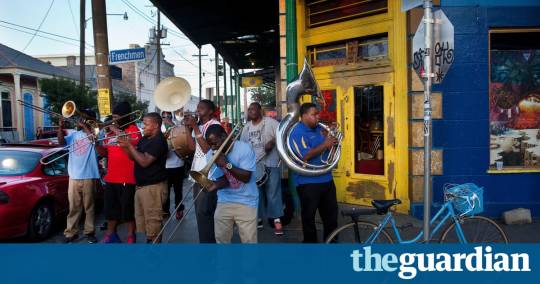
At a Sixth Street bar in the heart of Austin, Texas a pop up version of Sebs jazz club from the Hollywood hit film La La Land is being set up its blue letters yet to be switched on. Nearby, a replica of Breaking Bads Los Pollos Hermanos fast food restaurant has appeared, causing a minor Twitter frenzy.
These are just two of the attractions materialising in the city in time for the music and media festival South by Southwest (SXSW), and throughout the 10 days of the event it is hard to find someone who isnt wearing an official SXSW wristband worth $1,000.
What started 30 years ago as a celebration of Austins local music scene, though, is now in danger of harming the very thing that made it unique. SXSW brings in hundreds of artists from around the world, 200,000 visitors and $325.3m (250m) to the citys economy. Its success has helped Austin establish music as a fundamental part of its development, but at the same time, as many as 20% of musicians in this self-appointed live music capital of the world survive below the federal poverty line.
According to a recent study by the Urban Land Institute, the city is in the effective 11th hour of the endangerment of the live music scene, brought on by Austins rapid growth it is now the fastest growing city in the US in terms of population, jobs and economy.
A downtown wall mural in the shadow of new high-rise construction in Austin. Photograph: George Rose/Getty Images
Its a difficult reality for the city to confront. Austin is one of the three major US music cities, alongside New Orleans and Nashville, that have capitalised on this local culture at the risk of ruining the scenes that made them famous in the first place. In Austin, the local live music scene is now paying the price for its success. Brian Block, of the citys economic development office, says despite an apparent city-wide financial boom, local musicians income is at best stagnating, and possibly declining.
Hayes Carll, a 41-year-old Grammy-nominated artist who recently won Austins Musician of the Year, says that for most Texans, Austin is the mecca of music cities. It was where it all came together: the songs, the record stores, the community, the identity. It was the first place I went where I could say Im a singer-songwriter and they didnt ask me what my real job was.
Music lives throughout Austins 200 or so venues, the annual music awards and festivals, and the many brilliant artists including Townes Van Zandt and Janis Joplin who have called it home. It was where Willie Nelson allegedly reunited the hippies and rednecks when he first went on stage at the Armadillo World Headquarters in August 1972. Today, Austins love of local creativity is immortalised in folk singer Daniel Johnstons Hi, how are you? mural, depicting his iconic alien frog near the citys university.
SXSW brings $325m to the Austin economy each year. Photograph: Larry W Smith/EPA
But despite this rich history, long-standing venues in Austins downtown Red River District are being forced to adjust to an influx of new neighbours mostly expensive condos or hotels. Rising rents have forced venues like Holy Mountain and Red 7 to close, while noise complaints are an ongoing problem hotels offer earplugs for a better nights sleep.
Therere some less than wonderful aspects to the growth process, and I know a lot of friends who have had to leave Austin, says Carll, a Texan who has lived here for 12 years. Austin is going to have to fight to keep some of the things that made it special like the affordability and how you could be yourself and do whatever you wanted. When you become the hot cool city that everybodys moving to, some of that freedom can get pushed out.
The city government is keen to stress that theyre working to preserve the live music scene. In 2013 the Red River District was given its cultural title to highlight its local significance. Block says they are now implementing a Red River extended hours pilot programme in the hope that an extra hour of live music on the weekend will bring increased revenues to help cope with rising costs, and more paid work for the musicians.
Willie Nelson performs in his annual 4th of July Picnic at the Austin360 Amphitheater. Photograph: Gary Miller/Getty Images
The city is also revising its land development codes for the first time in 30 years in an effort to raise the profile of entertainment districts. There are other support systems that come from outside government too, such as Haam which provides access to affordable healthcare for low-income musicians. Music is very important to the culture, to the local economy and I think it will remain so. Hopefully we can get ahead of the issues we know are coming, Block says.
But some feel its too late. Im worried Austin will change negatively, says Carll. Its great that Austins identity revolves around music, and that the city government is trying to do things to correct it. But none of that will matter if musicians cant afford to live there, or the venues are shut down because of noise complaints, or you cant get to the venue because youre stuck in traffic on the highway.
New Orleans: music from cradle to grave
Louis Armstrong and his All Stars in a still from director Arthur Lubins musical New Orleans. Photograph: Frank Driggs Collection/Getty Images
Across the state border in Louisiana, New Orleans is facing similar problems as it develops and gentrifies. There are fears that without local government actively supporting musicians, the scenes survival could be at risk.
How do you keep a [music scene] real and authentic and yet encourage people to get involved? Its a paradox, says Jan Ramsey, editor of local magazine OffBeat. Theres an authenticity to the music and the people who make it, and the integration of black and white culture here we never want to lose that.
John Swenson, journalist and author of New Atlantis, Musicians Battle for the Survival of New Orleans says the music accompanies you from the cradle to the grave; its born out of the neighbourhoods and permeates all levels of society. Jazz was born here, tracing back to the mixture of African drums and European horns played by slaves in the late 19th century; and part of its musical heritage is a long list of prodigious artists, from Louis Armstrong to James Booker.
The Spotted Cat. Photograph: Alamy
This culture attracts some 10 million tourists to the city each year. But what is unique about it and gives the scene greater strength is how it has become an invaluable lifeline for the citys regeneration after the devastation wrought by Hurricane Katrina in 2005.
In the Spotted Cat, one of the long-standing venues on Frenchmen Street, manager Cheryl Abana talks quietly as a jazz singer performs to a crowded room. For a couple of years [after Katrina] it was pretty sad here and the music scene really helped out with trying to get everyones spirits up. It really helped build the city up again, she says.
One of the most successful programmes to support the creative community following Katrina was Musicians Village, devised by Harry Connick Jr and Branford Marsalis alongside Habitat for Humanity. Situated in the Upper Ninth ward one of the places hardest hit by the hurricane it is a community of homes built by volunteers to support displaced musicians. Its a symbol to musicians that my community will be there when I get back; were going to keep that tradition alive, says Jim Pate, executive director of the New Orleans Area Habitat for Humanity.
A decade on, and artists of all genres and ages live in the village, including some of the godfathers of New Orleans heritage like Little Freddie King. The musicians came back to New Orleans because music lived here, says Swenson.
People listen to music at a home in Musicians Village. Photograph: Mario Tama/Getty Images
Nashville: the original music city
In Nashville, Tennessee, just a few blocks away from the famous honky tonk highway of Broadway, mayor Megan Barry sits in her office overlooking the state capitol. She is surrounded by motifs of Nashvilles music history: theres a framed photograph of DeFord Bailey sitting on the steps of the Ryman auditorium, the first African American to perform at the Grand Ole Opry; and in the foyer hangs a painting by Chris Coleman of Kings of Leon. He gave it to Barry as a gift.
Music is everywhere. Although it has a heritage as influential as New Orleans, here it spreads further: from inside the mayors office and the governments music council, to pretty much everyone you meet in the city who either plays it, writes it or listens to it (every taxi driver I meet is a musician; my Airbnb host is a songwriter).
As soon as I mention the phrase music cities, Barry interrupts jovially: Well, I think theres only one! Music has been part of Nashvilles foundations since the 1800s when it established itself as a centre for music publishing. Its heritage goes back to the Fisk Jubilee Singers who were based here the African American a cappella band who were the first musical group to tour the world, raising money for freed slaves. Upon hearing them, Queen Victoria allegedly coined Nashvilles title as a music city, which is now plastered across Tennessee billboards.
Bars and honky-tonks line Broadway in Nashville. Photograph: Brian Jannsen/Alamy
In 1925, WSM radio station was founded, which went on to broadcast the Grand Ole Opry now the longest running radio show in the US that gave rise to some of the greatest names in country music. Music Row, the 200-acre area near downtown at its peak housed 270 music publishers, 120 record production agencies, 80 record manufacturing companies, 80 booking agencies and more. Elvis Heartbreak Hotel was recorded here at RCA in 1956; Bob Dylans Blonde on Blonde was recorded nearby at Columbia Recording studios 10 years later.
Now, the $10bn industry music industry provides 56,000 jobs, supporting more than $3.2bn of labour income annually. We cant undersell its importance to our overall economic viability and continued growth and prosperity, says Barry.
Nashville is projected to grow by 186,000 residents and 326,000 jobs in the next 25 years, and like Austin, has to confront uncomfortable growing pains in the form of gentrification. But music is firmly intertwined with the citys municipal plans for how it will develop in the future.
DeFord Bailey was the first African American to perform at the Grand Ole Opry. Photograph: GAB Archive/Redferns
The city provides affordable housing for musicians, and music programmes for school children, as we know our graduation rates go up when kids are involved in music, says Barry. They go on and they have a career in music and then it feeds the job creation. Its about feeding that pipeline.
I think that although music evolves and changes, the ability for Nashville to grow and change with it has been part of our success.
At Dinos bar in east Nashville, 26-year-old musician Cale Tyson is sipping on a beer. He is one of thousands of artists who moved here because of its history. I feel like Nashvilles a town where musicians are treated really well. I dont think anythings closed off here, says the Texan singer-songwriter. In Nashville the competition and being around so many good artists forces you to work a lot harder.
People continue to migrate to Nashville because of this (about 100 a day), and this influx has inevitably changed the music scene for better or worse. The country music capital of the world which ignited the careers of Hank Williams, Johnny Cash, Loretta Lynn and Kitty Wells to name just a few is now home to a burgeoning hip hop scene in the citys so-called DIY clubs. Jack White moved in and set up a branch of Third Man records in 2009, while bands like Paramore, Kings of Leon and the Black Keys have all migrated here.
Nashville has even spawned a genre called bro country, where burly men sing about chewing tobacco and celebrate being a redneck (with lyrics that repeat red red red red redneck), their odd rap verses a world away from the original country music that formed the soul of this city.
But the commercialisation of Nashville has led to accusations that country music is dead. A few years ago US country singer Collin Raye made a heartfelt plea for the city to get back to its roots and remember the musicians who built and sustained the Nashville industry and truly made country music an American art form, he said. It needs to be that way once again. God Bless Hank Williams. God Bless George Jones.
And people are still trying to keep this alive. I dont think traditional country went away, says Brendan Malone who runs a traditional honky tonk an event celebrating country music in the east of the city. The fire was still kindling. It just needed to have some gasoline poured on it.
At Malones Honky Tonk Tuesdays, a man in a check shirt is barbecuing some ribs in the car park of the US army veterans club. Inside, ageing regulars sit at the bar nursing whiskeys to the sound of Hank Williams on the juke box.
In the main room, men and women of all ages wearing Stetsons and western shirts take turns two-stepping with each other as the band covers songs of Ernest Tubb and Red Foley. They perform against a backdrop of the US flag laid out in fairy lights.
Theres a sincere sense of pride in Nashvilles history here, despite how far the city and its culture has changed. With support from the mayors office to the local community, it seems Nashville took a bet on music and it paid off.
Follow Guardian Cities on Twitter and Facebook to join the discussion, and explore our archive here
from All Of Beer http://allofbeer.com/the-final-bar-how-gentrification-threatens-americas-music-cities/
2 notes
·
View notes
Text
NewHopeshirt - Ghost Witch American Flag Beer Because 2020 Is Boo Sheet Shirt
NewHopeshirt – Ghost Witch American Flag Beer Because 2020 Is Boo Sheet Shirt

Buy this shirt: https://newhopeshirt.com/product/ghost-witch-american-flag-beer-2020-boo-sheet-shirt/
There’s the Ghost Witch American Flag Beer Because 2020 Is Boo Sheet Shirtin contrast I will get this slightly too spacious chambre de bonne; the endless sequence of overly attractive Frenchmen popping up like marionettes on every street corner. There are the personal-brand-building selfies with…
View On WordPress
0 notes
Text

Genevieve Tobin (November 29, 1899 – July 31, 1995) was an American actress.
Tobin was born in New York City on November 29, 1899. Her father, Thomas Tobin, a bank clerk who later became a racetrack bookmaker, was born in Nova Scotia, Canada and her mother, Genevieve, was born in Washington, D.C. She had a sister, Vivian, and a brother, George.
Tobin made her film debut in 1910 in Uncle Tom's Cabin as Eva.[citation needed] Her stage debut came in 1912 in Disraeli. She appeared in a few films as a child and formed a double act with her sister Vivian. Their brother, George, also had a brief acting career. Following her education in Paris and New York, Tobin concentrated on a stage career in New York.
Although she was seen most often in comedies, she also played the role of Cordelia in a Broadway production of King Lear in 1923. Popular with audiences, she was often praised by critics for her appearance and style rather than for her talent, but in 1929, she achieved a significant success in the play Fifty Million Frenchmen. She introduced and popularized the Cole Porter song "You Do Something to Me", and the success of the role led her back to Hollywood, where she performed regularly in comedy films from the early 1930s.
She played prominent supporting roles opposite such performers as Jeanette MacDonald, Nelson Eddy, Cary Grant, Barbara Stanwyck, Claudette Colbert, Joan Blondell, and Kay Francis, but occasionally played starring roles, in films such as Golden Harvest (1933) and Easy to Love (1934). She played secretary Della Street to Warren William's Perry Mason in The Case of the Lucky Legs (1935). One of her most successful performances was as a bored housewife in the drama The Petrified Forest (1936), starring Leslie Howard, Bette Davis, and Humphrey Bogart.
She married director William Keighley in 1938 and made only a few more films; her final film before retirement was No Time for Comedy (1940), with James Stewart and Rosalind Russell.
She remained married to Keighley until his death in 1984.
#classic hollywood#golden age of hollywood#classic movie stars#old hollywood#silent era#silent stars#silent cinema#silent hollywood#1920s hollywood#1930s hollywood
0 notes
Text

Genevieve Tobin (November 29, 1899 – July 31, 1995) was an American actress.
Tobin was born in New York City on November 29, 1899. Her father, Thomas Tobin, a bank clerk who later became a racetrack bookmaker, was born in Nova Scotia, Canada and her mother, Genevieve, was born in Washington, D.C. She had a sister, Vivian, and a brother, George.
Tobin made her film debut in 1910 in Uncle Tom's Cabin as Eva.[citation needed] Her stage debut came in 1912 in Disraeli.[1] She appeared in a few films as a child and formed a double act with her sister Vivian. Their brother, George, also had a brief acting career. Following her education in Paris and New York, Tobin concentrated on a stage career in New York.
Although she was seen most often in comedies, she also played the role of Cordelia in a Broadway production of King Lear in 1923. Popular with audiences, she was often praised by critics for her appearance and style rather than for her talent, but in 1929, she achieved a significant success in the play Fifty Million Frenchmen. She introduced and popularized the Cole Porter song "You Do Something to Me", and the success of the role led her back to Hollywood, where she performed regularly in comedy films from the early 1930s.
She played prominent supporting roles opposite such performers as Jeanette MacDonald, Nelson Eddy, Cary Grant, Barbara Stanwyck, Claudette Colbert, Joan Blondell, and Kay Francis, but occasionally played starring roles, in films such as Golden Harvest (1933) and Easy to Love (1934). She played secretary Della Street to Warren William's Perry Mason in The Case of the Lucky Legs (1935). One of her most successful performances was as a bored housewife in the drama The Petrified Forest (1936), starring Leslie Howard, Bette Davis, and Humphrey Bogart.
She married director William Keighley in 1938 and made only a few more films; her final film before retirement was No Time for Comedy (1940), with James Stewart and Rosalind Russell.
She remained married to Keighley until his death in 1984.
#silent movies#silent movie stars#silent hollywood#golden age of hollywood#classic movie stars#classic hollywood
0 notes
Text
Who Goes Nazi? Dorothy Thompson American Journalist.
From the August 1941 issue of Harpers Magazine.
It is an interesting and somewhat macabre parlor game to play at a large gathering of one’s acquaintances: to speculate who in a showdown would go Nazi. By now, I think I know. I have gone through the experience many times—in Germany, in Austria, and in France. I have come to know the types: the born Nazis, the Nazis whom democracy itself has created, the certain-to-be fellow-travelers. And I also know those who never, under any conceivable circumstances, would become Nazis.
It is preposterous to think that they are divided by any racial characteristics. Germans may be more susceptible to Nazism than most people, but I doubt it. Jews are barred out, but it is an arbitrary ruling. I know lots of Jews who are born Nazis and many others who would heil Hitler tomorrow morning if given a chance. There are Jews who have repudiated their own ancestors in order to become “Honorary Aryans and Nazis”; there are full-blooded Jews who have enthusiastically entered Hitler’s secret service. Nazism has nothing to do with race and nationality. It appeals to a certain type of mind.
It is also, to an immense extent, the disease of a generation—the generation which was either young or unborn at the end of the last war. This is as true of Englishmen, Frenchmen, and Americans as of Germans. It is the disease of the so-called “lost generation.”
Sometimes I think there are direct biological factors at work—a type of education, feeding, and physical training which has produced a new kind of human being with an imbalance in his nature. He has been fed vitamins and filled with energies that are beyond the capacity of his intellect to discipline. He has been treated to forms of education which have released him from inhibitions. His body is vigorous. His mind is childish. His soul has been almost completely neglected.
At any rate, let us look round the room.
The gentleman standing beside the fireplace with an almost untouched glass of whiskey beside him on the mantelpiece is Mr. A, a descendant of one of the great American families. There has never been an American Blue Book without several persons of his surname in it. He is poor and earns his living as an editor. He has had a classical education, has a sound and cultivated taste in literature, painting, and music; has not a touch of snobbery in him; is full of humor, courtesy, and wit. He was a lieutenant in the World War, is a Republican in politics, but voted twice for Roosevelt, last time for Willkie. He is modest, not particularly brilliant, a staunch friend, and a man who greatly enjoys the company of pretty and witty women. His wife, whom he adored, is dead, and he will never remarry.
He has never attracted any attention because of outstanding bravery. But I will put my hand in the fire that nothing on earth could ever make him a Nazi. He would greatly dislike fighting them, but they could never convert him. . . . Why not?
Beside him stands Mr. B, a man of his own class, graduate of the same preparatory school and university, rich, a sportsman, owner of a famous racing stable, vice-president of a bank, married to a well-known society belle. He is a good fellow and extremely popular. But if America were going Nazi he would certainly join up, and early. Why? . . . Why the one and not the other?
Mr. A has a life that is established according to a certain form of personal behavior. Although he has no money, his unostentatious distinction and education have always assured him a position. He has never been engaged in sharp competition. He is a free man. I doubt whether ever in his life he has done anything he did not want to do or anything that was against his code. Nazism wouldn’t fit in with his standards and he has never become accustomed to making concessions.
Mr. B has risen beyond his real abilities by virtue of health, good looks, and being a good mixer. He married for money and he has done lots of other things for money. His code is not his own; it is that of his class—no worse, no better, He fits easily into whatever pattern is successful. That is his sole measure of value—success. Nazism as a minority movement would not attract him. As a movement likely to attain power, it would.
The saturnine man over there talking with a lovely French emigree is already a Nazi. Mr. C is a brilliant and embittered intellectual. He was a poor white-trash Southern boy, a scholarship student at two universities where he took all the scholastic honors but was never invited to join a fraternity. His brilliant gifts won for him successively government positions, partnership in a prominent law firm, and eventually a highly paid job as a Wall Street adviser. He has always moved among important people and always been socially on the periphery. His colleagues have admired his brains and exploited them, but they have seldom invited him—or his wife—to dinner.
He is a snob, loathing his own snobbery. He despises the men about him—he despises, for instance, Mr. B—because he knows that what he has had to achieve by relentless work men like B have won by knowing the right people. But his contempt is inextricably mingled with envy. Even more than he hates the class into which he has insecurely risen, does he hate the people from whom he came. He hates his mother and his father for being his parents. He loathes everything that reminds him of his origins and his humiliations. He is bitterly anti-Semitic because the social insecurity of the Jews reminds him of his own psychological insecurity.
Pity he has utterly erased from his nature, and joy he has never known. He has an ambition, bitter and burning. It is to rise to such an eminence that no one can ever again humiliate him. Not to rule but to be the secret ruler, pulling the strings of puppets created by his brains. Already some of them are talking his language—though they have never met him.
There he sits: he talks awkwardly rather than glibly; he is courteous. He commands a distant and cold respect. But he is a very dangerous man. Were he primitive and brutal he would be a criminal—a murderer. But he is subtle and cruel. He would rise high in a Nazi regime. It would need men just like him—intellectual and ruthless. But Mr. C is not a born Nazi. He is the product of a democracy hypocritically preaching social equality and practicing a carelessly brutal snobbery. He is a sensitive, gifted man who has been humiliated into nihilism. He would laugh to see heads roll.
I think young D over there is the only born Nazi in the room. Young D is the spoiled only son of a doting mother. He has never been crossed in his life. He spends his time at the game of seeing what he can get away with. He is constantly arrested for speeding and his mother pays the fines. He has been ruthless toward two wives and his mother pays the alimony. His life is spent in sensation-seeking and theatricality. He is utterly inconsiderate of everybody. He is very good-looking, in a vacuous, cavalier way, and inordinately vain. He would certainly fancy himself in a uniform that gave him a chance to swagger and lord it over others.
Mrs. E would go Nazi as sure as you are born. That statement surprises you? Mrs. E seems so sweet, so clinging, so cowed. She is. She is a masochist. She is married to a man who never ceases to humiliate her, to lord it over her, to treat her with less consideration than he does his dogs. He is a prominent scientist, and Mrs. E, who married him very young, has persuaded herself that he is a genius, and that there is something of superior womanliness in her utter lack of pride, in her doglike devotion. She speaks disapprovingly of other “masculine” or insufficiently devoted wives. Her husband, however, is bored to death with her. He neglects her completely and she is looking for someone else before whom to pour her ecstatic self-abasement. She will titillate with pleased excitement to the first popular hero who proclaims the basic subordination of women.
On the other hand, Mrs. F would never go Nazi. She is the most popular woman in the room, handsome, gay, witty, and full of the warmest emotion. She was a popular actress ten years ago; married very happily; promptly had four children in a row; has a charming house, is not rich but has no money cares, has never cut herself off from her own happy-go-lucky profession, and is full of sound health and sound common sense. All men try to make love to her; she laughs at them all, and her husband is amused. She has stood on her own feet since she was a child, she has enormously helped her husband’s career (he is a lawyer), she would ornament any drawing-room in any capital, and she is as American as ice cream and cake.
How about the butler who is passing the drinks? I look at James with amused eyes. James is safe. James has been butler to the ‘ighest aristocracy, considers all Nazis parvenus and communists, and has a very good sense for “people of quality.” He serves the quiet editor with that friendly air of equality which good servants always show toward those they consider good enough to serve, and he serves the horsy gent stiffly and coldly.
Bill, the grandson of the chauffeur, is helping serve to-night. He is a product of a Bronx public school and high school, and works at night like this to help himself through City College, where he is studying engineering. He is a “proletarian,” though you’d never guess it if you saw him without that white coat. He plays a crack game of tennis—has been a tennis tutor in summer resorts—swims superbly, gets straight A’s in his classes, and thinks America is okay and don’t let anybody say it isn’t. He had a brief period of Youth Congress communism, but it was like the measles. He was not taken in the draft because his eyes are not good enough, but he wants to design airplanes, “like Sikorsky.” He thinks Lindbergh is “just another pilot with a build-up and a rich wife” and that he is “always talking down America, like how we couldn’t lick Hitler if we wanted to.” At this point Bill snorts.
Mr. G is a very intellectual young man who was an infant prodigy. He has been concerned with general ideas since the age of ten and has one of those minds that can scintillatingly rationalize everything. I have known him for ten years and in that time have heard him enthusiastically explain Marx, social credit, technocracy, Keynesian economics, Chestertonian distributism, and everything else one can imagine. Mr. G will never be a Nazi, because he will never be anything. His brain operates quite apart from the rest of his apparatus. He will certainly be able, however, fully to explain and apologize for Nazism if it ever comes along. But Mr. G is always a “deviationist.” When he played with communism he was a Trotskyist; when he talked of Keynes it was to suggest improvement; Chesterton’s economic ideas were all right but he was too bound to Catholic philosophy. So we may be sure that Mr. G would be a Nazi with purse-lipped qualifications. He would certainly be purged.
H is an historian and biographer. He is American of Dutch ancestry born and reared in the Middle West. He has been in love with America all his life. He can recite whole chapters of Thoreau and volumes of American poetry, from Emerson to Steve Benet. He knows Jefferson’s letters, Hamilton’s papers, Lincoln’s speeches. He is a collector of early American furniture, lives in New England, runs a farm for a hobby and doesn’t lose much money on it, and loathes parties like this one. He has a ribald and manly sense of humor, is unconventional and lost a college professorship because of a love affair. Afterward he married the lady and has lived happily ever afterward as the wages of sin.
H has never doubted his own authentic Americanism for one instant. This is his country, and he knows it from Acadia to Zenith. His ancestors fought in the Revolutionary War and in all the wars since. He is certainly an intellectual, but an intellectual smelling slightly of cow barns and damp tweeds. He is the most good-natured and genial man alive, but if anyone ever tries to make this country over into an imitation of Hitler’s, Mussolini’s, or Petain’s systems H will grab a gun and fight. Though H’s liberalism will not permit him to say it, it is his secret conviction that nobody whose ancestors have not been in this country since before the Civil War really understands America or would really fight for it against Nazism or any other foreign ism in a showdown.
But H is wrong. There is one other person in the room who would fight alongside H and he is not even an American citizen. He is a young German emigre, whom I brought along to the party. The people in the room look at him rather askance because he is so Germanic, so very blond-haired, so very blue-eyed, so tanned that somehow you expect him to be wearing shorts. He looks like the model of a Nazi. His English is flawed—he learned it only five years ago. He comes from an old East Prussian family; he was a member of the post-war Youth Movement and afterward of the Republican “Reichsbanner.” All his German friends went Nazi—without exception. He hiked to Switzerland penniless, there pursued his studies in New Testament Greek, sat under the great Protestant theologian, Karl Barth, came to America through the assistance of an American friend whom he had met in a university, got a job teaching the classics in a fashionable private school; quit, and is working now in an airplane factory—working on the night shift to make planes to send to Britain to defeat Germany. He has devoured volumes of American history, knows Whitman by heart, wonders why so few Americans have ever really read the Federalist papers, believes in the United States of Europe, the Union of the English-speaking world, and the coming democratic revolution all over the earth. He believes that America is the country of Creative Evolution once it shakes off its middle-class complacency, its bureaucratized industry, its tentacle-like and spreading government, and sets itself innerly free.
The people in the room think he is not an American, but he is more American than almost any of them. He has discovered America and his spirit is the spirit of the pioneers. He is furious with America because it does not realize its strength and beauty and power. He talks about the workmen in the factory where he is employed. . . . He took the job “in order to understand the real America.” He thinks the men are wonderful. “Why don’t you American in- tellectuals ever get to them; talk to them?”
I grin bitterly to myself, thinking that if we ever got into war with the Nazis he would probably be interned, while Mr. B and Mr. G and Mrs. E would be spreading defeatism at all such parties as this one. “Of course I don’t like Hitler but . . .”
Mr. J over there is a Jew. Mr. J is a very important man. He is immensely rich—he has made a fortune through a dozen directorates in various companies, through a fabulous marriage, through a speculative flair, and through a native gift for money and a native love of power. He is intelligent and arrogant. He seldom associates with Jews. He deplores any mention of the “Jewish question.” He believes that Hitler “should not be judged from the standpoint of anti-Semitism.” He thinks that “the Jews should be reserved on all political questions.” He considers Roosevelt “an enemy of business.” He thinks “It was a serious blow to the Jews that Frankfurter should have been appointed to the Supreme Court.”
The saturnine Mr. C—the real Nazi in the room—engages him in a flatteringly attentive conversation. Mr. J agrees with Mr. C wholly. Mr. J is definitely attracted by Mr. C. He goes out of his way to ask his name—they have never met before. “A very intelligent man.”
Mr. K contemplates the scene with a sad humor in his expressive eyes. Mr. K is also a Jew. Mr. K is a Jew from the South. He speaks with a Southern drawl. He tells inimitable stories. Ten years ago he owned a very successful business that he had built up from scratch. He sold it for a handsome price, settled his indigent relatives in business, and now enjoys an income for himself of about fifty dollars a week. At forty he began to write articles about odd and out-of-the-way places in American life. A bachelor, and a sad man who makes everybody laugh, he travels continually, knows America from a thousand different facets, and loves it in a quiet, deep, unostentatious way. He is a great friend of H, the biographer. Like H, his ancestors have been in this country since long before the Civil War. He is attracted to the young German. By and by they are together in the drawing-room. The impeccable gentleman of New England, the country-man—intellectual of the Middle West, the happy woman whom the gods love, the young German, the quiet, poised Jew from the South. And over on the other side are the others.
Mr. L has just come in. Mr. L is a lion these days. My hostess was all of a dither when she told me on the telephone, “ . . . and L is coming. You know it’s dreadfully hard to get him.” L is a very powerful labor leader. “My dear, he is a man of the people, but really fascinating.“ L is a man of the people and just exactly as fascinating as my horsy, bank vice-president, on-the-make acquaintance over there, and for the same reasons and in the same way. L makes speeches about the “third of the nation,” and L has made a darned good thing for himself out of championing the oppressed. He has the best car of anyone in this room; salary means nothing to him because he lives on an expense account. He agrees with the very largest and most powerful industrialists in the country that it is the business of the strong to boss the weak, and he has made collective bargaining into a legal compulsion to appoint him or his henchmen as “labor’s” agents, with the power to tax pay envelopes and do what they please with the money. L is the strongest natural-born Nazi in this room. Mr. B regards him with contempt tempered by hatred. Mr. B will use him. L is already parroting B’s speeches. He has the brains of Neanderthal man, but he has an infallible instinct for power. In private conversation he denounces the Jews as “parasites.” No one has ever asked him what are the creative functions of a highly paid agent, who takes a percentage off the labor of millions of men, and distributes it where and as it may add to his own political power.
It’s fun—a macabre sort of fun—this parlor game of “Who Goes Nazi?” And it simplifies things—asking the question in regard to specific personalities.
Kind, good, happy, gentlemanly, secure people never go Nazi. They may be the gentle philosopher whose name is in the Blue Book, or Bill from City College to whom democracy gave a chance to design airplanes—you’ll never make Nazis out of them. But the frustrated and humiliated intellectual, the rich and scared speculator, the spoiled son, the labor tyrant, the fellow who has achieved success by smelling out the wind of success—they would all go Nazi in a crisis.
Believe me, nice people don’t go Nazi. Their race, color, creed, or social condition is not the criterion. It is something in them.
Those who haven’t anything in them to tell them what they like and what they don’t-whether it is breeding, or happiness, or wisdom, or a code, however old-fashioned or however modern, go Nazi. It’s an amusing game. Try it at the next big party you go to.
2 notes
·
View notes
Note
Throwing it in last minute: For the character meme, Erik?

Erik (The Phantom of the Opera 1925)
How I feel about this character
LonChaney’s Erik is the best cinematic Phantom because he remembers that Erik issupposed to be alienating and unstable—not to mention, you know, not hot. We dopity Erik, of course, and Chaney contributes much tragic gravitas to thislonely, tortured genius, but he does also drop a chandelier on innocent peopleand attempt to force a young woman to marry him or else he’ll incinerate allher friends. As a teenage girl who was never asked out, viewed herself as ugly,and one of the outsiders at school, I related to Erik a lot. He was a greatvillain but also very tragic in his isolation. I saw him as a great rebelagainst the shallow and the fake. As an adult, my perspective is different:Erik is still tragic and I still love the hell outta him, but I do see that hisreaction to pain is not… well, legal. And yeah, Christine is kind of right toprefer Raoul. But this doesn’t ruin the character for me—it makes him much moremulti-layered than he was to my angsty teen self. (Thank God I’m not 16anymore!)
Letme talk more about Chaney though. This is the performance of a lifetime and heputs so many layers into this role. Yes, Erik is scary and homicidal at times,but he’s also very theatrical. Erik loves staging about everything, such as theway he meets Christine when they at last have their face-to-face meeting. He goesout of his way to appear mysterious and romantic, hypnotizing Christine as hetakes her through his otherworldly cellar lair. Every time he interacts withher, he puts on a kind of performance, whether he’s being the chaste lover or atyrannical monster. The entire opera house is his stage, a domain in which heholds all the power he cannot possess in normal society. This, in addition tohis artistic genius, is why the arts are his world. It’s only in his mostvulnerable moments that we see the true Erik: sad and lonely, despairing of theidea that he will ever find human companionship. And it is this quality whichdraws audiences to Erik despite his chandelier-breaking, party-crashing,kidnapping, lasso-throwing hobbies. Both Erik and Chaney’s film persona tappedinto that fear that there are things within us too monstrous to be loved orunderstood. Chaney’s poignant performance is the thing which also cancels outso many of the flaws of the 1925 adaptation: all the poor staging and badediting in the world fade away as he weaves his magic and breaks our hearts.
All the people I ship romanticallywith this character
Iwas once a huge Erik/Christine shipper, as most phans tend to be, particularlyin my teens. Nowadays, I don’t ship Chaney Erik with anyone, because I can’tsee him working out with anyone as he is. Maybe if he had been given the chancefor redemption and not died, he could have grown as a person and found lovewith someone who could accept him and his corpse-like appearance. But as is inthe film, dude needs therapy first.
My non-romantic OTP for this character
Erikand Ledoux/the Persian. Okay, so this is based off the book and earlier cuts ofthe movie than the final release, but I love the idea of Erik and the Persianhaving respect and even some affection toward one another. In the book, thePersian is certainly the closest thing Erik ever had to a friend.
My unpopular opinion about thischaracter
Ithink it’s for the best that Erik does not end up with Christine. Yeah, he’lltake her out on Sundays and buy her some sweet pairs of shoes, but he reallyisn’t ready for a relationship, to say the least!
One thing I wish would happen / hadhappened with this character in canon.
Thathe had died of a broken heart instead of been “a devil to the end” and murderedby a mob of hairy Frenchmen. The film’s messy production history is to blamefor the trajectory of Erik’s character development: it appears for much of thestory that Erik might be redeemed by Christine’s compassion, but nope! Let’smake him super evil and try to escape in the goofiest chase scene this side ofMack Sennett! Chaney’s make-up isn’t as good in these scenes (which were shotafter the filming was supposed to be completed); he likely rushed it because hewas irritated with Universal botching the movie so horribly. Every time we getthat medium shot of him laughing maniacally while driving the carriage, it’slike I’m watching Animaniacs orsomething. And I’m sorry, as bad as Erik can be when it comes to his conductaround Christine, he would not leave Christine out in the street like that. Headores her and bothered to take her along with him in the first place—why wouldhe leave her to get trampled like that? That was just so out of character thatit makes me want to tear my hair out whenever it happens.
Iwill admit the business of him pretending to have a bomb and then reveling inhow easily he’s able to scare the mob is a genius touch that almost redeemsthis dumbass ending though. ALMOST.
4 notes
·
View notes